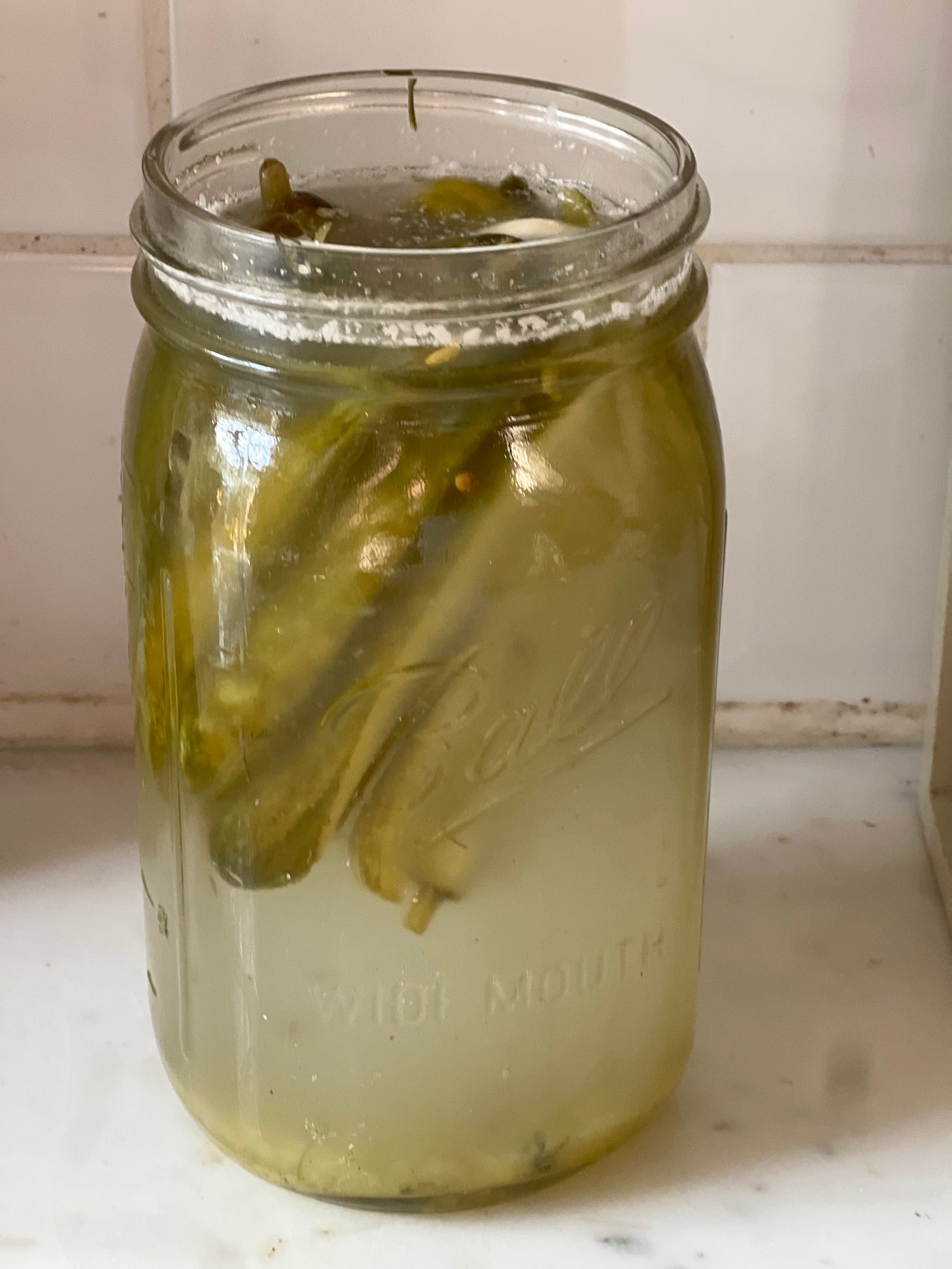You are either a pickle person or you aren’t. I am. In fact I can barely eat a meal without something pickled: be it those delicious little green pickled peppercorns, sour dill pickles, sweet pink pickled onions, or even a chutney. It’s that or a hot sauce. I find I cannot eat unadorned food without some form of sharply contrasting flavour.
I went to the launch of Nick Vadasz’ book The Pickle Jar at Divertimenti in posh Knightsbridge. A trained chef, he’s got a friendly, amiable, non-boasting vibe, with a slightly dishevelled humorous ‘I don’t know what I’m doing’ air which is disarming and actually not true. He should be on telly.
You might have seen his pickles in the main supermarkets. They are really good.
There are two main types of pickles: quick pickles in acid usually vinegar, and lacto-fermented. I like both but the second type is particularly good for your gut. I followed Nick’s recipe for making sour dill pickles. The water goes a milky colour -the lacto part (don’t worry about white mould, only worry about green).
It is lactic fermentation that turns milk into yoghurt. In fact eating lacto-fermented pickles will also help people who are lactose intolerant to digest milk products.
This is his recipe: depending on how long you ferment it for, and also the weather, you can have slightly sour, half-sour and fully sour. At the famous Katz’s deli (the orgasm scene in When Harry met Sally took place here) in New York you can order your pickle by degree of sourness.
You will need a very clean glass jar and either a small glass weight that fits in the top or, as I used, a small bowl that pushes down the pickles. Make sure the pickles are always covered with liquid. The salt should be 4% of the weight of the liquid.
Nick suggests 1.5 kilos of mini cucumbers. As I’m usually cooking for one, I just use enough to make a large jar, about six.
Mini recipe for sour pickled cucumbers
Handful of mini cucumbers, washed, unpeeled but cut lengthways into quarters.
Natural sea salt, 4% of the volume of water
1 garlic clove
Generous sprig of dill leaves
Put the cucumbers in the jar and cover with cold water to the top. Then empty out the water into a bowl on a set of scales and weigh. If the water weighs say, 200ml you will need 4 % of salt, that is 8g. I worked this out on google as I’m terrible at maths.
Add the salt and pour the lot back into the jar with the cucumbers. Add the garlic and dill and cover with the weight or bowl. If you have a lid, you’ll need to burp it every day.
In hot weather like now, you have sour pickles within about four days.
I like to use these make a pickle soup from Poland but they are also good in salad or bagels. I also drink the juice or add it to salad dressings or even a pickleback cocktail.
Nick is of Hungarian parentage on his father’s side. Hungarian food is an interesting blend of East and West: but both the invading Ottomans and the Eastern Europeans love a pickle. So pickles are part of his DNA. His dad came over to the UK via Austria, as an 18 year old refugee after the Russian invasion of 1956.
“He couldn't speak English very well, but he was very bright. He has a photographic memory and did the equivalent of his A levels. Within a year, he was studying medicine at Guys Hospital and became a doctor of rheumatology.”
Nick is Jewish on his grandmother’s side and Jewish cuisine is an important influence in Hungarian food. “They had a house in Lake Balaton and had a place in Budapest. But they suffered terribly in the war there - a lot of family members perished in the concentration camps.”
“My dad married an English woman, so I can swear in Hungarian, but I can't do much else. Dad's famous swear words- we learned very well. You can't print them because they're so rude. Hungarians don't just say fuck off, they really go to town - into terrible details.” Nick laughs.
“My childhood was either him or my grandmother cooking for us. The family favourite was stuffed paprika – minced pork and beef packed into peppers dropped into a really simple tomato sauce that was bubbling away, thickened with a root, some paprika and sugar as well.
“The paprika smell when you walked in the house, or even close to the house, wafting through the window, was something that instantly reminds me of growing up from a child.”
“Gran would make just the simplest of green salads. So she’d get a little gem lettuce and she'd make a dressing with lemon juice, sugar, a bit of salt and pepper and water and no oil either. “
I had an oil-free salad dressing just like that in Vienna I tell Nick.
“It's so refreshing. It's sharp, sweet and lemony, and it goes so well with the fried schnitzel.”
“For Christmas we’d have Beigli, a traditional pastry. There's two versions, a poppy seed paste rolled in a shortcrust pastry or the one I prefer, which is delicious, a version where you make the paste from walnuts, apple, sultanas and lemon zest.”
This sounds similar to a dessert I had on my last visit to Budapest and tried to recreate at home.
Buy Nick’s book The Pickle Jar here (affiliated link from amazon)
Read my article Postcard from Hungary on this brilliant site ckbk.com where for a monthly subscription you get access to thousands of cookbooks and reference works.





